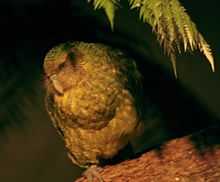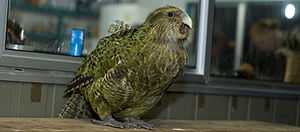Sirocco (parrot)
| Sirocco | |
|---|---|
 Sirocco visits Auckland Zoo, September 2009 | |
| Species | Kakapo, Strigops habroptila |
| Sex | Male |
| Born |
23 March 1997 Codfish Island, New Zealand |
| Nation from | New Zealand |
| Known for |
Attempting to mate with Mark Carwardine on BBC series Last Chance to See Ambassador for his species and for conservation |
| Parents |
Zephyr (mother) Felix (father) |
| Website | |
| biography on DoC website | |
Sirocco is a Kakapo, a large nocturnal parrot, and one of the few remaining Kakapo in the world. He achieved individual fame following an incident on the BBC television series Last Chance to See in which he attempted to mate with zoologist Mark Carwardine. Subsequent featuring of the incident on television channels around the world and on YouTube resulted in Sirocco becoming internationally known. In his home country of New Zealand, Sirocco has attracted thousands of people during 'personal' appearances, and in January 2010 was given the title of Official Spokesbird for Conservation by Prime Minister John Key. In this role, Sirocco helps advocate for conservation through human intermediaries on social media sites and blogs.
Biography

Sirocco was hatched on 23 March 1997 on Codfish Island off the west coast of Stewart Island, south of the New Zealand mainland. At three weeks old he suffered a respiratory illness which led to him being taken away from his mother, Zephyr, and hand-raised by Department of Conservation rangers.[1]
He had to be raised away from other Kakapo and this led to him being imprinted on humans. As an older bird, he still does not associate with other Kakapo. This extends to the mating ritual of 'booming'; Sirocco booms in the presence of humans, rather than female Kakapo. Sirocco is therefore seen as unlikely to be successful when it comes to breeding. However, his affinity to human beings means he has become an effective advocate for the Kakapo species.[1]
As Codfish Island, a protected sanctuary, is closed to the public, this has involved Sirocco travelling away from his home. Since 2006 he has regularly appeared on Ulva Island as part of a 'Kakapo encounter';[2] then in September 2009 he travelled to Auckland Zoo where he was visited by thousands of people.[3] Sirocco appeared at Zealandia wildlife sanctuary in October 2011 and at Maungatautari Ecological Island in 2012.
Last Chance to See incident
In 2009, zoologist Mark Carwardine and television presenter Stephen Fry visited Codfish Island as part of a series for the Last Chance to See, focusing on endangered species around the world.[4] While they were filming Sirocco, the bird hopped onto Carwardine's head and attempted to mate with him. The scene itself and Fry's commentary, "Sorry, but this is one of the funniest things I've ever seen. You are being shagged by a rare parrot", proved an instant television hit, being featured on news items around the world.[5]
A video of the incident was uploaded to YouTube,[6] where it received more than 700,000 views in the first week. A year on, more than 2 million people had viewed the clip, and as of July 2014 the clip has been viewed over 6.1 million times. Sirocco's Facebook page and Twitter account, set up after the screening, instantly attracted thousands of followers.[7]
Spokesbird
Sirocco's 'fame', and awareness that the television incident had massively raised the profile of Kakapo around the world, led to an unusual government appointment for the bird in January 2010.
New Zealand Prime Minister John Key appointed Sirocco as Official Spokesbird for Conservation, to coincide with 2010 being the International Year of Biodiversity.[8] Key commented "He's a very media savvy bird, he's got a worldwide fan base - they hang on every squawk that comes out of his beak. He'll be a great official spokesbird and a great ambassador for New Zealand."
While tongue in cheek, the appointment showed awareness of the ability of Sirocco, through his television and social network presence, to attract and engage with people around the world, thus highlighting the plight of the still-endangered Kākāpō.
References
- ↑ 1.0 1.1 Kakapo Recovery Team – Sirocco Biography
- ↑ Kakapo Recovery Team – Ulva Island
- ↑ Gibson, Eloise (12 September 2009). "Comical kakapo has guest spot at Auckland zoo". The New Zealand Herald. Retrieved 12 November 2011.
- ↑ Last Chance to See – BBC
- ↑ Williams, David (9 October 2009). "Frisky kakapo romps to fame". Stuff.co.nz. Retrieved 12 November 2011.
- ↑ Shagged by a rare parrot - Last Chance To See - BBC Two, YouTube.
- ↑ "Sirocco the kakapo shoots to fame". Television New Zealand. 20 October 2009. Retrieved 12 November 2011.
- ↑ John Key appoints Sirocco as Spokesbird for Conservation
External links
- NZ Department of Conservation Sirocco biography
- NZ Department of Conservation blog on the Sirocco phenomenon
- Sirocco's appearance at Auckland Zoo, covered by Campbell Live
- Shagged by a rare parrot - Last Chance To See - BBC Two, on YouTube
| ||||||||||||||||||||||||||